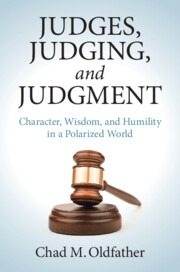Book contents
- Judges, Judging, and Judgment
- Judges, Judging, and Judgment
- Copyright page
- Dedication
- Contents
- Acknowledgments
- Introduction
- 1 The Standard Model of Judging
- 2 Indeterminacy and Ideology
- 3 The Psychology of Judging
- 4 Internal Constraints on Judicial Behavior
- 5 External Constraints on Judicial Behavior
- 6 The Importance (and Erosion) of Norms
- 7 Specialization and Methodology as Partial Solutions
- 8 Character, Wisdom, and Humility
- Conclusion
- Index
8 - Character, Wisdom, and Humility
Published online by Cambridge University Press: 03 January 2025
- Judges, Judging, and Judgment
- Judges, Judging, and Judgment
- Copyright page
- Dedication
- Contents
- Acknowledgments
- Introduction
- 1 The Standard Model of Judging
- 2 Indeterminacy and Ideology
- 3 The Psychology of Judging
- 4 Internal Constraints on Judicial Behavior
- 5 External Constraints on Judicial Behavior
- 6 The Importance (and Erosion) of Norms
- 7 Specialization and Methodology as Partial Solutions
- 8 Character, Wisdom, and Humility
- Conclusion
- Index
Summary
This chapter argues that because judging inevitably requires the exercise of judgment, one of our most critical concerns should be ensuring that the people we select as judges have good judgment. It explores what good judgment might mean and draws on work in both law and philosophy exploring the nature of judicial character. It further explores two components of judicial character, specifically practical wisdom and intellectual humility, and in the case of the latter, surveys a growing body of work in philosophy and psychology that investigates humility’s nature and benefits. It briefly outlines ways in which a renewed emphasis on judicial character might be implemented.
Keywords
- Type
- Chapter
- Information
- Judges, Judging, and JudgmentCharacter, Wisdom, and Humility in a Polarized World, pp. 174 - 200Publisher: Cambridge University PressPrint publication year: 2025

